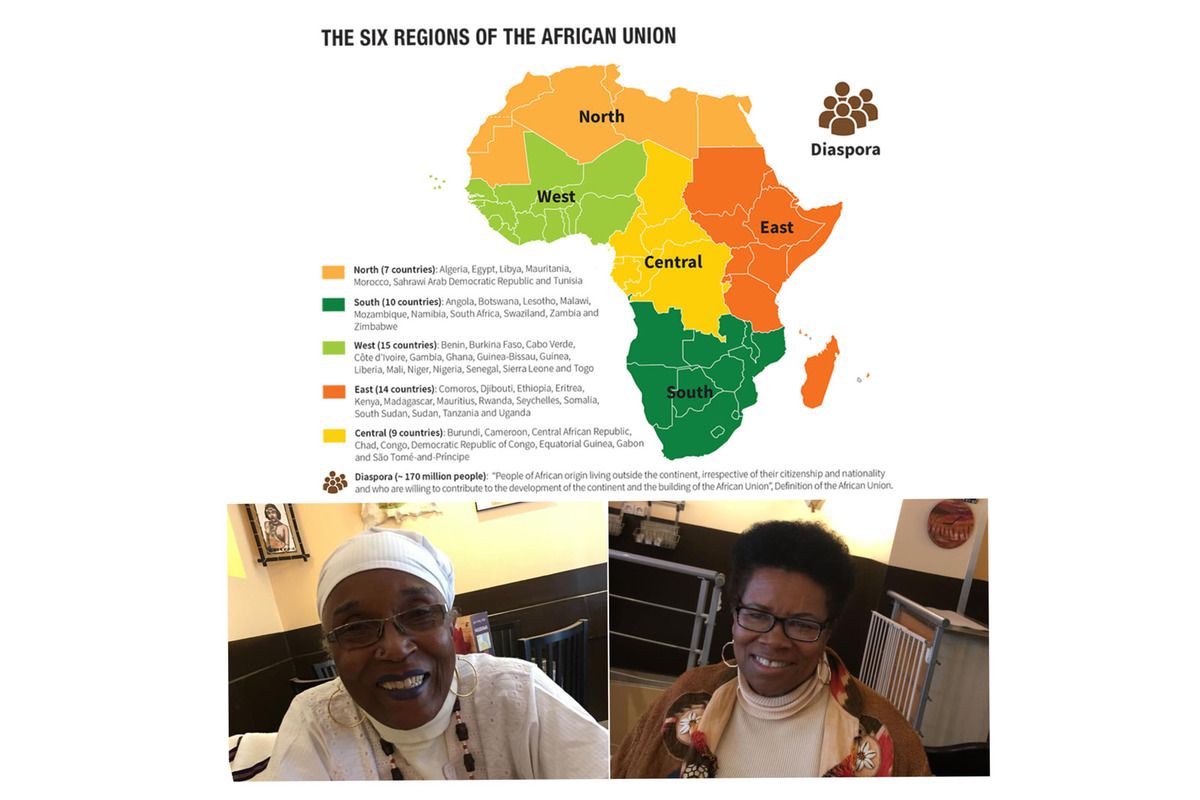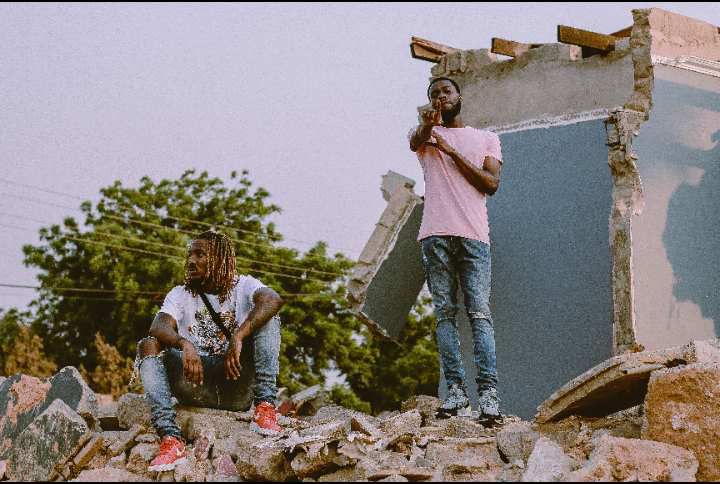We Cannot Call Anywhere Our Home
We cannot call anywhere our home!!
Here is the plea of so many African Americans, who proudly consider Africa to be the land of their ancestry and ancestors.
As I was checking out the bold launch of The State of the Diaspora last week in Paris, which pegged itself to the official entity that is the 6th region of the African Union, I met two beautiful African American sisters who have repatriated to Ghana and encourage others to do so.
The 6th region has an important role in their view, as it is meant to be the official entity representing all the Historic Unique African Diasporas as a result of the Transatlantic Slave Trade such as Black people of African Descent in South America, North America and the Caribbean… which account for 170 million people according to the African Union (AU). These groups, despite their African descent are not granted African Citizenships, even though a proportion of them would happily repatriate to Africa should they have the opportunity and legal right to do so. Hence, the importance for these unique groups to be constituted into a State attached to the African Union to be accounted for and eventually granted citizenships. Whilst the 6th region has full legitimacy, the auto-proclaimed creation of a State of the Diaspora is regrettable in my view.
I believe that the alleged Prime Minister would have gained much more credibility as a Head of Project aiming to constitute a State represented by a Government democratically elected. Additionally, it must be said that this project of a State has only received the backing of 3 countries, so far, that are part of the African Union. It would need far more than a 5th of African States supporting the initiative to have a legitimate existence.
As a result, this meeting was vehemently boycotted by a number of Pan African groups. I do understand their stance although I deeply dislike the manner in which some of these groups came to the press conference to publicly humiliate those involved not considering that the Caribbean and South American dignitaries who were present had a different status. There are ways of expressing disagreement, even to condemn actions but, disrespecting flesh and blood will never take us very far as a people. In my view, it simply demonstrates very little respect for oneself and others.
Coming back to my two precious sistahs, both retirees in their seventies; they had flown over from Ghana, connected flights at Addis Ababa to arrive in Paris to see what they could learn from their brothers and sisters in Europe. Unfortunately, it wasn’t to be so and after hate speeches broke out at the press conference, one of our precious Mamas fell ill and was urgently taken to hospital in an ambulance due to high blood pressure. I am so grateful that both my friend Mohamadou and myself were there at the time it happened and were able to support as it was out of the question that they should be left on their own, knowing that they couldn’t speak French.
As for me, the value of attending this event was meeting with them and what I found out about their plea.
Auntie Earna is a beautiful sistah from Detroit who repatriated to Ghana when she retired from her teaching job. Auntie Earna’s first encounter with the continent of her ancestors was at 8 years old when she met a first African national. At 11 years old, she was given her first National Geographic magazine by her dad which had he found on a bus. She read all about different places in Africa and knew then that’s where she wanted to go. Her dad admonished her to have a good education as this would be her passport to go anywhere in the world. When she was 15, a secondary school teacher introduced her class to African History in which they were taught about the different African countries and their capitals. As a young adult, Earna started to meet a variety of African Nationals such as Ethiopians, Ghanaian and more and she started working 2 to 3 jobs so one day she could go to Africa. This she eventually did, going back and forth to 18 African countries taking students and teachers with her. Then in June 2000 after a key encounter, she bought a piece of land in Ghana, built her house in 2002 and retired there from teaching. However, it took almost 15 years for her to be granted citizenship. Auntie Earna would say “So many of us are interested in going back. Quite a few of us ended up going to Ghana”. However, once they arrive in Ghana, many African Americans who currently amount to 7,000 people in Ghana alone, pensioners contributing to a minimum of 63 million dollars a year, often have a tourist visa and become illegal once the tourist visa has run out, as there is no swift procedure to recognise this Historical Unique diaspora as lawful Africans.
Mama Imakhus Okofu also known as “One Africa” decided to repatriate to Ghana in 1989 with her husband. They own a health resort which serves as a retreat. Mama Imakhus believes that the mission given to her by the ancestors is “to help as many people as possible to escape from the US.”
To her, The United States remains a land of exploitation of the Black race, the only place in the world where Black citizens are an amendment to the constitution (3/5th of a man), who have eventually been bonified as full humans and granted citizenships. Up to today, she will explain that the Voters Rights Bill still determines every 25 years if Black people can continue voting. Black people, who are undeniably, the builders of America, the farming land, are the only ethnic group this applies to.
However, for these Africans born in America who have been called “negros, coloured, black, Afro-American, African-American”, the reality is bleak when it comes to being recognised on the African continent. Many retirees arrive in Africa with the will and the desire to contribute to the development of the country only to be looked upon as outsiders.
As Ghana was publicly declaring “the year of return”, both Earna and Imakhus attended the Homecoming Summit only to realise that this call to the diaspora was for Ghanaians leaving abroad. Yet, they are hopeful that the message is more than a touristic plot and this year, 250 African Americans who have lived in the country for over 25 years have applied for citizenship and are awaiting a conclusive outcome.
One Africa has also championed a petition in Ghana, click below for more information on the work of these two beautiful sistahs and mamas, as well as for more info on the 6th region of the AU.

/image%2F2575472%2F20180507%2Fob_0df9a9_logo-white.png)
/image%2F2785598%2F20221013%2Fob_af235a_16901922.jpg)
/image%2F2785598%2F20221013%2Fob_bc40c3_nanny-of-the-maroons.jpg)
/image%2F2785598%2F20221013%2Fob_ee13cc_queen-nanny-as-pictured-on-a-jamaican.jpg)


/image%2F2785598%2F20220217%2Fob_ac714a_hamamat-montia.jpg)
/https%3A%2F%2Fwww.hamamat.com%2Fwp-content%2Fuploads%2F2021%2F07%2FTongo-Body-Scrub-Formula-113g.jpeg)
/image%2F2785598%2F20210519%2Fob_fcf5c9_fuse-odg.png)
/image%2F2785598%2F20210530%2Fob_73a973_odg.jpg)

/https%3A%2F%2Fassets.change.org%2Fphotos%2F0%2Fjx%2Fuu%2FlpJxUuqqYWaMlDl-1600x900-noPad.jpg%3F1569965193%23width%3D1600%26height%3D900)
/https%3A%2F%2Fwww.oneafricahealthresort.com%2Fwp-content%2Fuploads%2F2019%2F02%2FCharles-2.jpg%23width%3D682%26height%3D497)
/https%3A%2F%2Fau.int%2Fsites%2Fdefault%2Ffiles%2Fauweblogo-en.png%23width%3D1157%26height%3D409)


